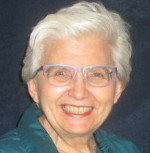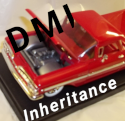.png)
A Godly Inheritance
[A family history book, written to honour my beloved Grosz'mama, or Gr'ma; started in 1985 and completed October 1988].
Introduction
After I'd moved back to Hague from London, Ontario, to help out my parents, I visited my Gr'ma in the Altenheim and told her, "Grosz'mama, I'm going to write a book about your life, and share with the other cousins and their children the example you have been to me."
My Gr'ma pursed her lips demurely and agreed, "It's always good to write down the important things for the later generations to read." This would be our gift to her descendants.
Just think; what if our forefather, Isa Brand von Riesen, back in the early 1800s had prepared 100 copies of his forefather's history highlights, maybe drawings too. Now there are thousands of his descendants who would consider themselves fortunate to own one of those copies.
Perhaps more than of Gr'ma's other grandchildren, I've got vivid recollections of both grandparents, and most of my uncles and aunts. I love to tell these stories too.
Gram'pa Kroeker was a huge silent man, a giant in my eyes, a man of few words, and of whom I was terribly shy. One time he picked up a story book of mine from school as I was sent out to check on my brothers. When I returned I didn't have the courage to ask for it back. Another time he handed me a big fat adult book as a gift. (I think it was a Reader's Digest Book Club volume with 4 or 5 novels in it. Too hard for him to read.)
Maybe my chattering grated on him, for once he stopped me in my tracks by muttering, "I vish you was a radio - I'd svitch you off."
It was really Gr'ma who brought us up. Mom was sick, and in and out of hospitals so often that Grosz'mama, (as we said in Low German, and we were taught to address her in Low German out of respect) - yes, Gr'ma was my mother-figure and high tower of strength and godly wisdom.
Oh the stories I could tell! Like when the rooster chased me the long way around to their familiar door, and how teenage Uncle Henry swizzled that rooster in the barn cistern to bring him to his senses. Of berry-picking holidays when I could sleep over, but was under orders to make myself useful to Gr'ma. Of watching visitors coming and going at that house. Of the excitement in the air when Gr'ma got word that some of our uncles and aunts and cousins were coming to visit. Sometimes from B.C., or Quill Lake. How we children cavorted all over the back pasture with our cousins and got acquainted. However, this is Gr'ma's story and I'll let her be the star. Most of all, her attitude towards people impressed me. Whether her cousins or mine, or just friends of some distant relative, she treated each one with dignity and respect. I can still see her, upon noticing a car turn into the drive between the caragana hedges, hurrying to put on her black kerchief with the tassels and embroidery before going to the door. If there were men she must have her head covered according to the teachings of the Old Colony Church.
When my uncles and aunts tell me that their family was the poorest in the village and looked-down-on by the rest of the clan, I marvel. I thought all the world revered and honoured Gr'ma. Her guests praised her cooking and raved about her gardens, and extolled her excellent memory. Sometimes they came specifically to ask Gr'ma to recall the date so-and-so was born, or baptized, or how long he was married to his first wife. She usually had such information at the tip of her tongue, but liked to defer to her Register to confirm it.
Though Gram'pa's father had once been a school teacher, Gram'pa had never had any reading or figuring lessons except what Gr'ma taught him the first winter they were married. So it was Gr'ma who always read their nightly Bible chapter. I was about 9 when I discovered this. I had just earned a brand new Bible in Sunday School for my memory verses and her example inspired me to start such a daily devotional habit of my own.
Unwittingly, I absorbed Gr'ma's faith, her integrity, her abiding curiosity in people and books, and took her for my role model. I know this is a different era and time, and I wouldn't try to repeat all Gr'ma had been through, yet today the greatest compliment anyone can pay me is to say I'm just like my Grosz'mama. These, and more of her character traits are her legacy to us and to future generations yet unborn. Somebody should put it down on paper! Well, if nobody else will - I'll try!
What I had thought would be a four month project from New Year's Day in 1985 took me three years, because Gr'ma became ill, and ended up in the Rosthern hospital - her very first hospital stay in her 89 years of life. Then she came to stay with us until there was an opening in the Nursing Home.
I ended up learning to translate from the handwritten, or Gothic German Script, as Gr'ma and I struggled over her journals with a magnifying glass because her eyesight was failing. With her help, I learned to decipher it, and gained a new and marketable skill - translation.
Since her memory was no longer reliable, I had to do serious research to get a full count of her cousins and their families. While I only meant to confirm some of the things in her Register, I gained large blocks of more data, plus a growing network of new friends.
The appendix of genealogy charts were built from Gr'ma's Family Register, but since I published that book by hand, cranking the pages off the old Gestetner behind the furnace in 1988, much more information has come in to me. What was to be a book to honour Gr'ma has grown in more ways than I first dreamed. I was bit by the "Genealogy" bug; I kept trying to set it aside, to contain it to a mere hobby position - but sometimes it does get out of hand!
So far I've produced two revisions of the Neudorf genealogy when quite a bit more came in to expand that branch. The Kroeker branch still needs some major break-throughs, but just now it is time to present all the data collected on the Friesens' branch of our tree. Oh, how it has multiplied!
A Note About Names
Gr'ma said her name, Elisabeth, was spelled with the German s spelling, as it was in the generations before her. So unless I have clear records otherwise, I have spelled those Elisabeths who were her age or older with the s and those younger, such as my mother, with the z.
Gr'ma told me the tradition was to name babies after their grandparents, and the names of the favourite ones were used first. Then other babies were named after other dear relatives. It was quite an honour to have a baby named after you. But why names of babies that died in infancy were used again for successive babies sometimes is harder to explain. Babies born in the 1950s and onwards got more modern, even original and foreign-sounding names.
You'll notice that in the 20s and 30s there were many Isbrands, Jacobs, Henrys and Peters, also Annas and Marias in Chorititz. There could be three or four in an area with the same first and last name. To tell the difference, nicknames were used for children.
The boys, upon becoming men, would often take as a middle initial the surname of their mother's family, as readily as of their father's first name. Gr'ma's brothers David and Jacob, took I from their father's first name, Isbrand. But her brother Isbrand took the initial N, representing his mother's Neudorf name.
To continue in the more recently, (abridged) edition -
Chapter 1:
Our Friesen Forefathers (Part I - The Friesens).
Our Neudorf Forefathers (Part 2 covers the Neudorf roots)


